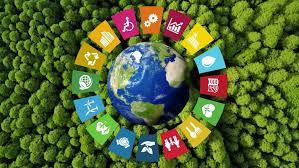The Importance of Environmental Development
Environmental development plays a crucial role in shaping the future of our planet. It involves sustainable practices and initiatives aimed at preserving natural resources, protecting ecosystems, and mitigating the impact of human activities on the environment.
One key aspect of environmental development is promoting renewable energy sources such as solar, wind, and hydroelectric power. By reducing reliance on fossil fuels, we can decrease carbon emissions and combat climate change. Investing in clean energy technologies not only benefits the environment but also creates new job opportunities and stimulates economic growth.
Another vital component of environmental development is conservation efforts to protect biodiversity. Preserving diverse ecosystems and wildlife habitats is essential for maintaining ecological balance and ensuring the survival of species. Initiatives like reforestation, wildlife sanctuaries, and marine conservation areas help safeguard our natural heritage for future generations.
Furthermore, sustainable urban planning is integral to environmental development. Designing cities with green spaces, efficient public transportation systems, and eco-friendly infrastructure reduces pollution levels and enhances residents’ quality of life. Smart city initiatives that utilise technology to improve resource management and reduce energy consumption are also crucial for building environmentally sustainable communities.
In conclusion, environmental development is not just a choice but a necessity for securing a better future for our planet. By prioritising sustainability, conservation, and innovation, we can create a world where humans coexist harmoniously with nature. It is up to individuals, governments, businesses, and communities to work together towards achieving a greener and more sustainable world.
Six Essential Tips for Promoting Sustainable Environmental Development
- Reduce, reuse, and recycle to minimise waste
- Conserve water by fixing leaks and using water-saving appliances
- Switch to renewable energy sources like solar or wind power
- Plant trees and create green spaces to improve air quality
- Support local farmers and buy organic produce to reduce carbon footprint
- Educate yourself and others about environmental issues for a sustainable future
Reduce, reuse, and recycle to minimise waste
Reducing, reusing, and recycling are fundamental principles in environmental development that play a significant role in minimising waste and promoting sustainability. By reducing consumption, finding creative ways to reuse items, and recycling materials to give them a new life, we can lessen the burden on landfills, conserve resources, and lower our carbon footprint. Embracing the mantra of “reduce, reuse, recycle” empowers individuals and communities to make a positive impact on the environment by adopting more mindful consumption habits and contributing to a circular economy that values efficiency and conservation.
Conserve water by fixing leaks and using water-saving appliances
Conserving water through proactive measures such as fixing leaks and utilising water-saving appliances is a simple yet effective tip for promoting environmental development. By addressing leaks promptly and investing in efficient appliances, individuals can significantly reduce water wastage and contribute to sustainable water management. This small behavioural change not only helps conserve a precious resource but also lowers utility bills and lessens the strain on water supply systems. Embracing such practices demonstrates a commitment to environmental stewardship and sets a positive example for others to follow in creating a more sustainable future.
Switch to renewable energy sources like solar or wind power
Switching to renewable energy sources such as solar or wind power is a crucial step towards sustainable environmental development. By harnessing the power of these clean energy alternatives, we can significantly reduce our carbon footprint and combat climate change. Embracing renewable energy not only helps to preserve the planet’s natural resources but also promotes innovation in the energy sector, creating a greener and more sustainable future for generations to come.
Plant trees and create green spaces to improve air quality
Planting trees and creating green spaces are effective strategies for enhancing air quality and promoting environmental development. Trees act as natural air filters, absorbing pollutants and releasing oxygen into the atmosphere. By increasing the greenery in urban areas, we can reduce harmful emissions, mitigate the effects of climate change, and create healthier living environments for both humans and wildlife. Investing in tree planting initiatives and preserving green spaces not only improves air quality but also contributes to the overall well-being of communities by providing shade, reducing noise pollution, and fostering a sense of connection to nature.
Support local farmers and buy organic produce to reduce carbon footprint
Supporting local farmers and opting for organic produce are effective ways to contribute to environmental development by reducing carbon footprint. By purchasing locally grown food, you support sustainable agricultural practices that require less energy for transportation compared to imported goods. Additionally, choosing organic products helps minimise the use of synthetic pesticides and fertilisers, which can have harmful effects on ecosystems and water sources. By making these simple yet impactful choices, individuals can play a part in promoting a more sustainable food system and reducing their environmental impact.
Educate yourself and others about environmental issues for a sustainable future
To ensure a sustainable future, it is essential to educate oneself and others about environmental issues. By increasing awareness and understanding of the challenges facing our planet, individuals can make informed decisions and take proactive steps towards positive change. Sharing knowledge and promoting environmental education not only empowers individuals to adopt eco-friendly practices in their daily lives but also fosters a collective commitment to preserving our natural resources for future generations. Education is a powerful tool in creating a more sustainable and environmentally conscious society.
